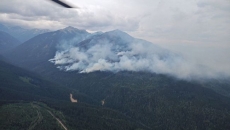Health Canada approved Pfizer-BioNTech's updated COVID-19 vaccine on Tuesday, marking its third authorization of vaccine formulations that protect against the most recently circulating variants of the virus.
Pfizer-BioNTech's mRNA vaccine, called Comirnaty, targets the KP.2 subvariant of Omicron, replacing the previous version that targeted the XBB.1.5 Omicron subvariant.
The approval of Comirnaty follows last week's authorization of Moderna's updated Spikevax mRNA vaccine and Novavax’s updated protein-based vaccine, Nuvaxovid.
Health Canada recently asked provinces and territories to get rid of their older COVID-19 vaccines to ensure the most current vaccine will be used during this fall's respiratory virus season.
The timelines for when people can roll up their sleeves to get the new shots is up to the provinces and territories, Public Health Agency of Canada spokesperson Anna Maddison said in an email last week.
"Canada has secured sufficient supply of COVID-19 vaccines to meet provincial and territorial demand requirements for fall and winter 2024 vaccination campaigns," she said.
The Novavax vaccine targets the JN.1 subvariant, while the Pfizer and Moderna vaccines target the KP.2 subvariant. KP.2 is a sublineage of the JN.1 strain.
Pfizer and Moderna vaccines are approved for adults and for children six months of age and older.
Novavax's vaccine is approved for adults and for children 12 years and older. Nuvaxovid's product monograph says the vaccine has not yet been evaluated for safety and efficacy in children under 12.
In May, the National Advisory Committee on Immunization issued guidance for use of updated COVID-19 vaccines this fall if they were to be approved by Health Canada.
In that guidance, NACI strongly recommended updated COVID-19 vaccinations for all adults 65 and older, people living in long-term care and other group living settings, people with underlying conditions that put them at higher risk of severe illness, people from Indigenous and racialized communities, and those who are pregnant or who provide essential community services.
NACI said all other adults and children six months or older should also be eligible for an updated COVID-19 vaccination this fall.
According to the Public Health Agency of Canada's wastewater data, updated on Tuesday, COVID-19 viral activity is moderate on a national level, but some wastewater collection points in Yukon, British Columbia, Manitoba, New Brunswick and Newfoundland and Labrador have registered high levels of activity as of Sept. 8.






